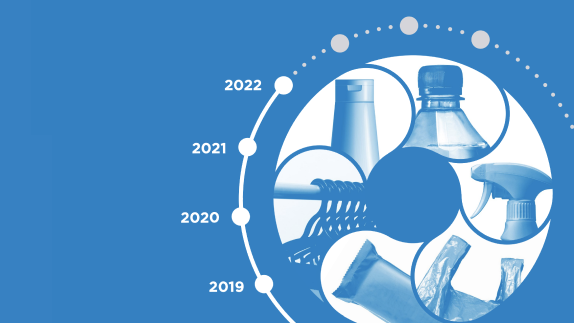On July 23, 2020, The Pew Charitable Trusts and SYSTEMIQ - with thought partners the Ellen MacArthur Foundation, University of Oxford, University of Leeds, and Common Seas - will release Breaking the Plastic Wave, one of the most comprehensive and analytically robust studies ever produced on ocean plastics. In its position paper, the Ellen MacArthur Foundation has set out its perspective on the study’s findings, and made its own calls to action for industry and policy makers.
Breaking the Plastic Wave shows that by 2040, if we fail to act, the volume of plastic on the market will double, the annual volume of plastic entering the ocean will almost triple (from 11m tonnes in 2016 to 29m tonnes in 2040), and ocean plastic stocks will quadruple (reaching over 600m tonnes).
In its position paper, the Ellen MacArthur Foundation sets out clear urgent actions for businesses and governments, including:
ELIMINATE the plastics we don’t need – not just removing the straws and carrier bags – but rapidly scaling innovative new delivery models that deliver products to customers without packaging or by using reusable packaging, and setting ambitious targets to reduce virgin plastic use. Plastic use should be reduced by nearly 50% by 2040 compared to business-as-usual. This is the equivalent of net-zero growth in plastic use versus today.
Rapidly design all plastic items to be reusable, recyclable or compostable. It is also crucial to fund the necessary infrastructure, rapidly increasing our ability to collect and CIRCULATE these items. This will require around USD 30 billion on-going annual funding in a best case scenario. Therefore mechanisms that improve the economics of recycling and provide stable recurring funding streams with fair industry contributions, such as Extended Producer Responsibility (EPR) or equivalent industry-led initiatives, must urgently be put in place globally.
INNOVATE at unprecedented speed and scale towards new business models, product design, materials, technologies, and collection systems to accelerate the transition to a circular economycircular economyA systems solution framework that tackles global challenges like climate change, biodiversity loss, waste, and pollution. It is based on three principles, driven by design: eliminate waste and pollution, circulate products and materials (at their highest value), and regenerate nature.. If the plastics and the waste management industries increased their R&D intensity to the same level as, for example, the machinery industry, it would create a USD 100 billion per annum R&D agenda by 2040 – a quadrupling of R&D investment versus today’s levels.
Breaking the Plastic Wave shows that compared with business-as-usual, the type of comprehensive circular economy approach set out in this paper has the potential to generate savings of USD 200 billion per year, reduce greenhouse gases by 25%, and create 700,000 net additional jobs by 2040.
Dame Ellen MacArthur, founder of the Ellen MacArthur Foundation, said: “Breaking the Plastic Wave brings an unprecedented level of detail into the global plastic system, confirming that without fundamental change, by 2050 there could be more plastics than fish in the ocean. To turn the tide on plastic waste and pollution, we need to radically increase our efforts and speed up the transition to a circular economy. We must eliminate the plastics we don’t need, and drastically reduce virgin plastic use. We need to innovate to create new materials and reusereuseThe repeated use of a product or component for its intended purpose without significant modification. business models. And we need improved infrastructure to ensure all plastics we use are circulated in the economy and never become waste or pollution. The question is not whether a circular economy for plastic is possible, but what we will do together to make it happen.”
For more information or to request an interview, please contact: charlotte.martin@hkstrategies.com D: +44 207 413 3027 M: +44 7478 680 201
Notes to Editor
About the Ellen MacArthur Foundation
The Ellen MacArthur Foundation was launched in 2010 with the aim of accelerating the transition to the circular economy. Since its creation, the charity has emerged as a global thought leader, putting the circular economy on the agenda of decision-makers around the world. The charity’s work focuses on seven key areas: insight and analysis; business; institutions, governments, and cities; systemic initiatives; circular design; learning; and communications.
Further information: www.ellenmacarthurfoundation.org | @circulareconomy
About the New Plastics Economy
Since 2016, the Ellen MacArthur Foundation’s New Plastics Economy initiative has rallied businesses and governments behind a common vision of a circular economy for plastic. Its 2016 and 2017 New Plastics Economy reports captured worldwide headlines, revealing the financial and environmental costs of waste plastic and pollution.
In October 2018, the Ellen MacArthur Foundation launched the Global Commitment, which now has over 450 organisations committed to eliminating problematic and unnecessary plastic packaging, and innovating so that all plastic packaging is 100% reusable, recyclable, or compostable, and can be safely and easily circulated without becoming waste or pollution.
The initiative is supported by Wendy Schmidt as Lead Philanthropic Partner, and the Oak Foundation as a Philanthropic Partner. Amcor, Borealis, The Coca-Cola Company, Danone, L’Oréal, MARS, Nestlé, PepsiCo, Unilever, Veolia and Walmart are the initiative’s Partners.
Further information: www.newplasticseconomy.org | @circulareconomy





